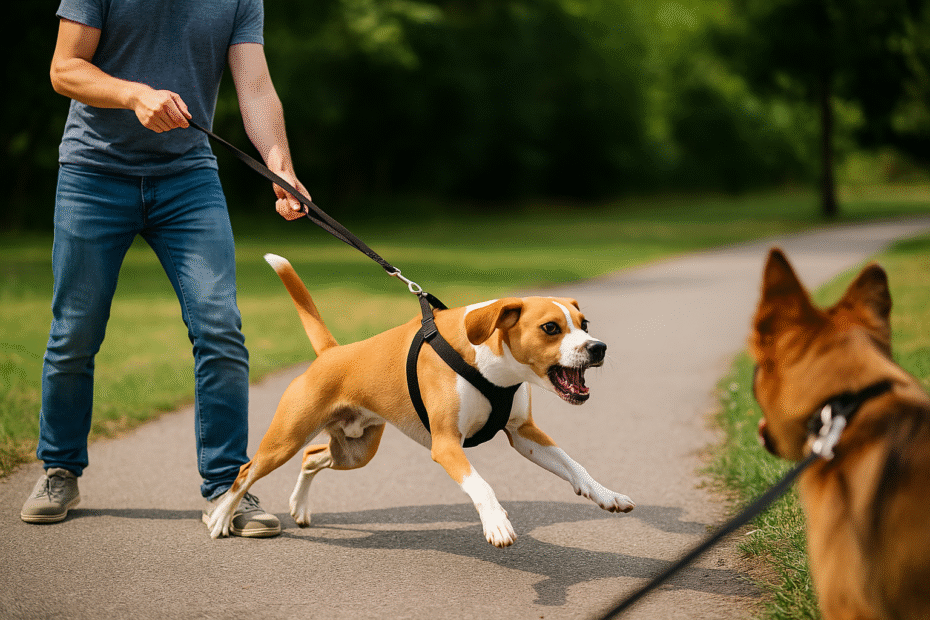Part 1: The Everyday Challenges
If you’ve ever felt like you’re the only one struggling with your dog’s behaviour, you’re not alone. Recently, I reviewed approximately 50 posts over a 2 week period from a busy dog training group on social media, and the same patterns came up again and again. These posts were written by everyday dog guardians asking for help, not professionals, and they reflect what people are really facing in their homes, backyards and local communities. It gave me a sneak peek at what dog guardians are struggling with in their lives with their beloved pooches.
This isn’t a scientific study, but it does show us where the stress points are for many dog guardians and how we might be able to make things easier.
Let’s talk about what came up most often.
1. Leash Pulling
Leash manners came up more than anything else when I looked at what dog guardians are struggling with. Whether it’s puppies, rescue dogs, or adult dogs who’ve never really got the hang of it, guardians were fed up with being dragged around. Several people had even been injured.
What was interesting is that many of these dogs walked beautifully off-lead. It’s not that they don’t know how to move with their guardian. They just don’t understand what the lead means. Or they do, and they hate being restricted by it.
What helps? Teaching dogs that walking on a loose lead is a skill that earns them access to the world and not just something we force them to do just because we’re holding the other end. The Pet Professional Guild Australia has a great resource on teaching your dog to walk on a loose lead.
2. Recall That Only Works When It Suits Them
Closely tied with lead frustration was the issue of recall. A lot of dogs in these posts had zero interest in coming back once off lead. Some guardians were using food rewards but struggling to compete with the distractions of the real world.
The reality is, “come here” means very little to a dog unless we’ve taught them it’s valuable and worth stopping what they’re doing for. That takes consistency, great rewards, and a bit of strategy. Not just shouting and hoping for the best.
3. Dog-to-Dog Reactivity
Reactivity is an umbrella term, but in this context, it showed up as barking, lunging or growling at other dogs while out and about. Some dogs were fearful. Others were overexcited. A few had had bad experiences that changed their behaviour completely. Reactivity is probably the most scariest experience that dog guardians are struggling with. If you’ve ever had a reactive dog then you’ve experienced that fear first hand.
There’s a lot to unpack here — but what stood out was how many guardians blamed themselves. They felt guilty, ashamed or embarrassed.
We need to normalise this: reactivity is common, and it’s not a sign of failure. It’s a communication problem that can be improved with the right tools and mindset. These dogs are having really big feelings and they need space to process them. We need to help them change their emotional response to what’s going on around them. The saying goes “They’re not giving you a hard time. They’re having a hard time”.
4. Destructive Behaviour and Chewing
This one’s especially common in adolescent dogs, but it didn’t stop there. Dogs were chewing beds, clothes, fences, furniture, toys — even each other’s belongings. In some cases, a new dog in the home had reignited chewing behaviour in an older dog who hadn’t chewed in over a year.
While some destruction is common in dogs (stick chewing etc.), it can become a sign of boredom, frustration, or unmet needs. Not just “naughty behaviour”. It’s a dog saying, “This life doesn’t suit me right now.”
So What Do We Do With This?
These social media posts showed a pattern: dogs struggling with impulse control, frustration, and communication — and humans trying their best with what they know. It’s not about blaming guardians or dogs. It’s about building better bridges between the two.
In next week’s blog, I’ll break down the emotional struggles that came up in the same posts — including fear, anxiety and aggression — and what we can do to support dogs who are finding the world overwhelming.
Need Help Sooner?
If you’re dealing with any of these behaviours, know that it doesn’t have to stay this way. I offer in-home consultations and group classes that focus on games-based, force-free training to make life easier for both you and your dog. Head to the Services page to book a spot in puppy classes or a one-to-one consultation, or just to find out more.
Game On! Let’s Play!
Hxx
Written with the assistance of AI

